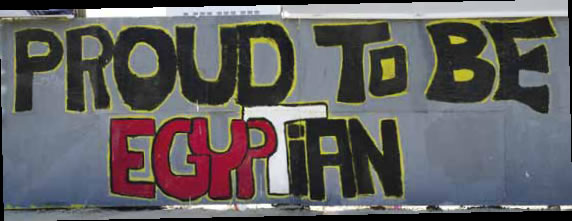
|
  |
Taxi adorned with the Egyptian flag


Graffiti by Freedom Painters group in Nasr City

Campaign titled Oum Ya Masry [Rise Up, Egyptian] held by AUC's Help Club to raise awareness of constitutional and voting rights
After the January 25th revolution, a renewed sense of pride and patriotism defined the Egyptian spirit. "You see it on
the streets," said James Curiel, assistant professor of sociology. "People were longing for freedom that they didn't have,
and they earned it in their own way ––– the Egyptian way."
It's not only pride, but also political engagement and participation. "Instead of having conversations on what they ate
for lunch or the movie they went to, youth on Facebook are now talking about politics, civic service and public events," said Mona Amer '98, assistant professor of psychology. "There is a greater sense of nationalism and responsibility toward
one's country."
The January 25th revolution marked the end of the 30-year Mubarak era and the dawn of a new beginning for Egypt,
one in which the word "Egyptian" carries with it a sense of accomplishment and triumph. Slogans of "Hold your head up high, for you're Egyptian" have resonated throughout the country.
Graffiti artists have organized
themselves into groups and painted the
streets of Cairo with nationalist themes
as a means of self-expression. Songs in
the name of Egypt have flourished,
and commodities carrying the
Egyptian flag –– from tissue boxes and
accessories to T-shirts and wristbands –– have infiltrated the market. At
AUC, student clubs have taken on a
number of post-revolution initiatives,
including awareness sessions on the
Egyptian constitution, donation
campaigns for the families of martyrs
and talk shows hosting experts in
different fields. In the midst of this
heightened sense of glory, however,
skepticism about Egypt's future
remains high.
"People are worried about safety and
security issues, economic prospects, and
religious tension and extremism," said
Amer. "There was euphoria and
excitement with the ousting of
Mubarak that made many live in a
utopian fantasy that everything will
change to the better. In reality, to make
changes in Egypt in terms of politics,
education and people's attitudes, it will
take time." Curiel also warned of the
consequences of losing one's way. "If we
let paranoia and fear get the best of us,
change can be destructive," he said. "People have to continually remember
that we need each other and that in
order to move forward to something
new, some of the old has to be there." Agreeing, Amer noted, "We need to
take good things of the past and be
realistic. The key is to know where
you're going. If the goal is fuzzy,
change will come about based on trial and error. The real danger is that some
people will try to take advantage of
this transitional period and chaos to
make changes that suit their own
personal benefits at the expense of
true, positive change.
" To combat that, Amer explained,
Egypt is in need of a coordinated
national effort to promote positive
social interaction and channel youth's
heightened sense of volunteerism. "Many people want to volunteer to
make changes in the country, but don't
know how," she said. "Most of the
efforts that have taken place have shortterm
returns. If you clean the streets
today, that's not going to take care of
the streets for the next 20 years. There
should be a community-networking
clearinghouse with a complete database
of civic organizations in Egypt. NGOs
should coordinate better with one
another, and companies must promote
corporate social responsibility. This is
also the best time for political parties to
ask people to join. … The more the
change is systemic and within a formal
organizational structure, the more likely
it will sustain itself and grow."
For Curiel, praying, coupled with rational thinking, constitute the way forward. "People need to search their souls for spiritual guidance," he said. "Don't be bogged down by the damage and suffering, but focus on finding solutions and considering possibilities. Try to be more informed, consider the sources of news and trust in your reasoning. … Egypt has enormous capacity. Its people can do amazing things and go amazing places."
By Dalia Al Nimr